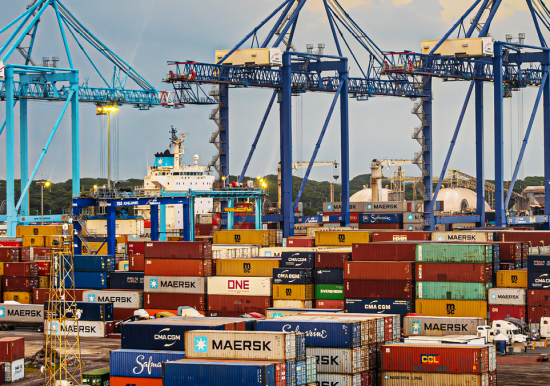
Punching Above Its Weight — Singapore Standing Tall
Singapore moves from 3rd place to 1st in the 2023 CGGI.
Singapore gained its independence back in 1965 and since then, from a small island with limited natural resources and prospects, it has grown to consistently rank globally as one of the safest and most desirable places to live and do business in. Good government is credited as being the not-so-secret of its success. Singapore’s national development has inspired a huge amount of scholarship and analysis, while its civil service is frequently held up as an example of what a highly trained, high-performing government looks like in practice.
The Chandler Institute of Governance spoke with three experts from across government, business, and academia to explore different perspectives on what is powering Singapore’s strong performance, how it has responded to the polycrisis, and the key challenges looming on its horizon.
Dr. Ann Florini , Fellow, Political Reform Programme New America
Dr Ann FLORINI, an academic and author who, in 2006, founded the Centre on Asia and Globalisation at the National University of Singapore. Dr Florini later created and ran the unique Masters of Tri-Sector Collaboration at the Singapore Management University, a programme focused on helping business, civil society, and government work together. Dr Florini is now a Fellow in the Political Reform programme at New America and on the Arizona State Universtity Faculty, and has previously held senior appointments at the Brookings Institution and Carnegie Endowment for International Peace.
Dr. Hsien-Hsien Lei , Chief Executive Officer, The American Chamber of Commerce in Singapore
Dr Hsien-Hsien LEI, who, as CEO of the American Chamber of Commerce in Singapore, leads “the largest and most active international business association in Singapore and Southeast Asia”, representing the interests of more than 600 companies registered in Singapore. Dr Lei is also an Adjunct Associate Professor at the National University of Singapore Saw Swee Hock School of Public Health, and a member of the Johns Hopkins Bloomberg School of Public Health’s Advisory Board.
Lim Siong Guan , Former Head of the Civil Service, Singapore
LIM Siong Guan, who over his 37-year career in the Singapore government held roles that included serving as the first Principal Private Secretary of Singapore’s founding Prime Minister Lee Kuan Yew, and as the Head of the Civil Service. He also, in separate stints, served as a permanent secretary at the Ministries of Defence, Education, and Finance, and the Prime Minister’s Office. Among other positions of leadership throughout his career, Mr Lim was Chairman of the Singapore Economic Development Board, and Group President of GIC, one of the country’s sovereign wealth funds, from 2007 to 2016.
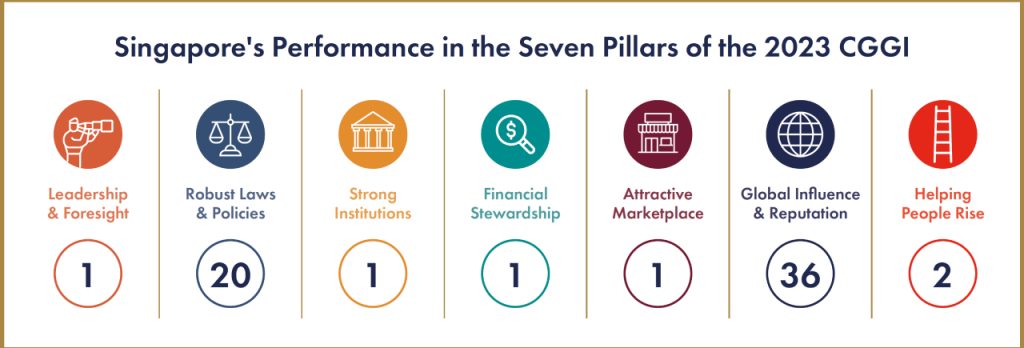
Singapore moved from 3rd to 1st in the 2023 Chandler Good Government Index. To what extent do you agree with the rankings, and what do you see as the strengths of the Singapore government?
Lim Siong Guan: From the earliest days of modern Singapore, there have been clear principles for national governance which the government has consistently practised. They can be summarised as:
- Leadership is Key: Competent and effective leadership, worthy of trust.
- Anticipating Change; Staying Relevant: Future-oriented yet doing well today.
- A Stake for Everyone; Opportunities for All: Looking out for all.
- Meritocracy: Recognition and reward according to performance and contribution, with integrity and incorruptibility.
Besides living out these principles, a particular strength of the Singapore government is the almost natural capacity to operate on a whole-of-government basis, and sometimes even on a whole-of-nation basis. An important reason for this is the physical smallness of Singapore, because it allows an ease of communication and an agility of response which larger countries will find significantly more difficult to do.
I think Singapore’s #1 ranking on the Chandler Good Government Index is deserved from an objective point of view, but not good because it may diminish the sense of urgency to keep doing better with even greater creativity and imagination.
Dr. Hsien-Hsien Lei: Singapore has earned its high ranking on the Index through sound governance, stability, transparency, and clear communications. Companies have made Singapore their regional headquarters due to the predictability of the business environment along with a safe and strong infrastructure. The government regularly conducts consultations with stakeholders to gauge sentiment and receive feedback which is often incorporated into future decision-making. Singapore has rational employment, tax and business policies that enable growth and support sustainability.
We asked Dr Lei about the government’s policies and initiatives she felt supported businesses and investors, and how Singapore had adjusted to meet the changing needs of businesses and investors in recent years.
Singapore is a great partner to businesses and investors. The Economic Development Board (EDB) enables the success of foreign companies by facilitating investments, supporting innovation, connecting potential partners, and providing access to government incentives. Additionally, the Ministry of Manpower has rolled out a number of initiatives including the COMPASS framework and the ONE pass to support the talent needs of businesses in a transparent and fair manner.
But clearly today, investors and businesses are facing major disruptions to operations. Risk mitigation is top of mind. Singapore has strategically developed 2030 plans for trade, manufacturing, and sustainability along with others that hold opportunities for the public and private sectors to solve problems together. In particular, both local and foreign businesses have the chance to raise Singapore’s competitiveness in the global marketplace and lead in innovation, technology and the green economy.
The focus of this report is how governments can respond to the current polycrisis. How prepared is Singapore?
Lim Siong Guan: The Singapore government is thinking about the future all the time, for which it has a well-oiled scenario- and strategic-planning process. But specifically planning for the future can only extend to the known-knowns and the known-unknowns. The government also needs the capacity to cope with the unknown-unknowns. Here the qualities of being aware of important changes happening in the world, being alert to new dangers, and having the agility to change and to respond quickly and appropriately, having a facility to learn through doing, are all critical.
Dr. Hsien-Hsien Lei: Singapore is good at looking around corners. Even more important, Singapore’s leaders learn from experience and critically examine how to be prepared for future crises. For example, in March 2023, a white paper on Singapore’s response to COVID-19 was published by the government, in which they identified what was done well, what could have been done better, and the lessons learned. These lessons are not only applicable to future pandemics, but also to other crises: prioritisation, resilience, partnerships, capacity building, science & technology, crisis planning and management, and clear communications.
Dr. Ann Florini: “Polycrisis” conveys the idea that we have a cascading series of problems that are all interacting with each other. That interaction is something that governments generally are very bad at managing, because they have divided themselves into bureaucracies focused on dealing with a single problem. There’s a lot of talk about whole-of-government approaches and very little execution of them.
Singapore does better than most at finding ways of looking across different components and problems. It has some advantages in the way ministers move across agencies. Another advantage, frankly, is that it’s small. And therefore, there’s a small group of people who are all trying to do the same thing.
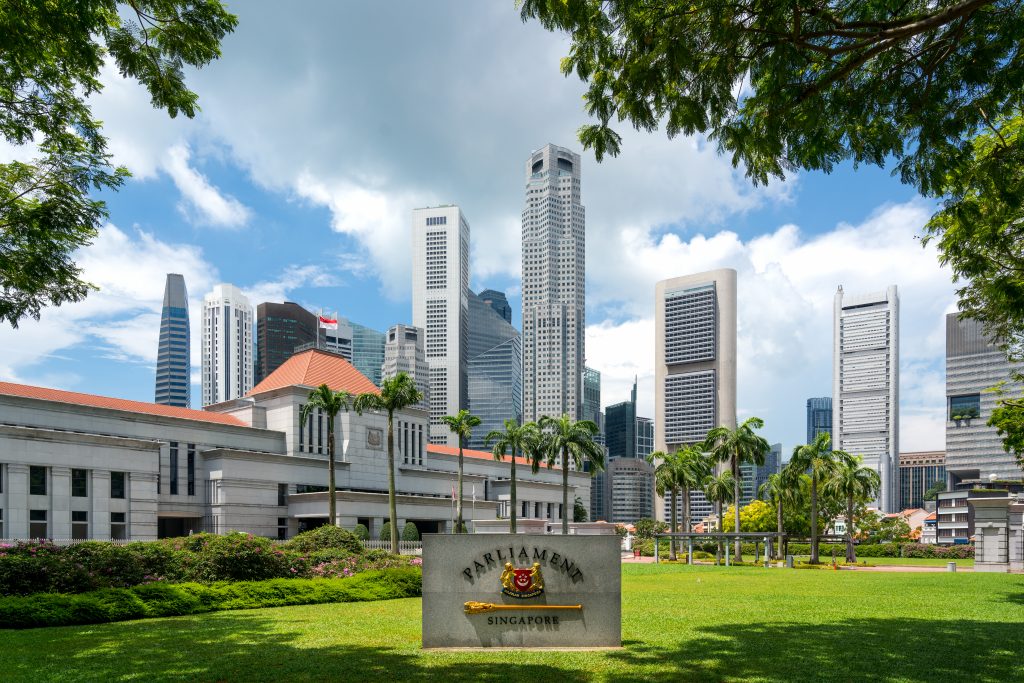
We asked Dr Florini a follow-up question: Given that scenario planning is an important capability that can help governments anticipate — and therefore better navigate – crises, what are Singapore’s capabilities in this area?
I think Singapore is best-in-class when it comes to using futures methodologies and scenarios methodologies and inculcating an understanding of that approach throughout the government.
I was blown away by Singapore’s futures work. I participated in some of the training sessions the Civil Service College conducted for government officials at various levels. When I designed the programme for Singapore Management University, we had an entire module on scenarios and futures, taught by a person who conducts training for the Singapore government.
That approach is absolutely necessary for governments to be able to cope with the polycrisis, because if you have no capacity to look ahead, you’re going to be continuously blindsided. The standard tools of public policy – which are very linear and assume that things will settle back down – often rely on false assumptions. Scenarios methodology forces you out of your usual boxes of thinking. And it allows room for human imagination and speculation. Scenarios are not forecasts – they’ll never work as forecasts. If you try to use them as predictions of what’s going to happen, they’re probably actively unhelpful. But if you use them as a way of enlightening people and getting them to think about how all these different pieces fit together, they’re extraordinary.
I’d love to see government officials from all over the world getting that kind of training. Some do. But it is nothing like Singapore’s broad, systemic approach to cultivating an understanding of future scenarios and their complexities.
What are some of the biggest challenges facing Singapore?
We put this question to Mr Lim with a focus on the civil service: What were the challenges Singapore’s civil service faced, and what capabilities does the country need to build to maintain its high standards?
Lim Siong Guan: In the earlier decades of Singapore’s independence, where the government would like Singapore to get to in, say, 30 years, can by and large be seen somewhere in the world. The dream for the future is a dream of possibilities already achieved somewhere else. The challenge for Singapore then is to choose where we want to go, to learn how to do it and to adapt accordingly. It is the most sensible approach in the passage from Third World to First World.
The challenge for the civil service of Singapore today is to dream the Singapore 30 years from now which we cannot see anywhere in the world today. It is a challenge of imagination and creativity, of learning through doing, and of being able to secure public trust, interest, support and participation all along the way.
In the next five years, Singapore will need to maintain its competitive edge against other markets that are growing more rapidly and have a younger working population.
Dr. Hsien-Hsien Lei, Chief Executive Officer, The American Chamber of Commerce in Singapore
Dr. Hsien-Hsien Lei: In the next five years, Singapore will need to maintain its competitive edge against other markets that are growing more rapidly and have a younger working population. The demographics of Singapore as a super-ageing society will require a shift in mindset in how local and foreign companies along with local and foreign talent can contribute to the economy together with multiplicative effect. The digital economy is also changing consumer behaviour which will place new demands on supply chains. Overall, Singapore is well-positioned to face any challenges that come up because of its thoughtful, well-researched and open approach.
Dr. Ann Florini: One obvious problem that Singapore faces is the US-China relationship. That is so challenging for all concerned, and it is very hard to see the situation simplifying for Singapore in the near future. I think given the conditions under which it finds itself, Singapore’s doing a good job at walking those tight-ropes.
We also live in a very fragile global economy, and Singapore, because it is such an outward-looking country, is particularly vulnerable to downturns.
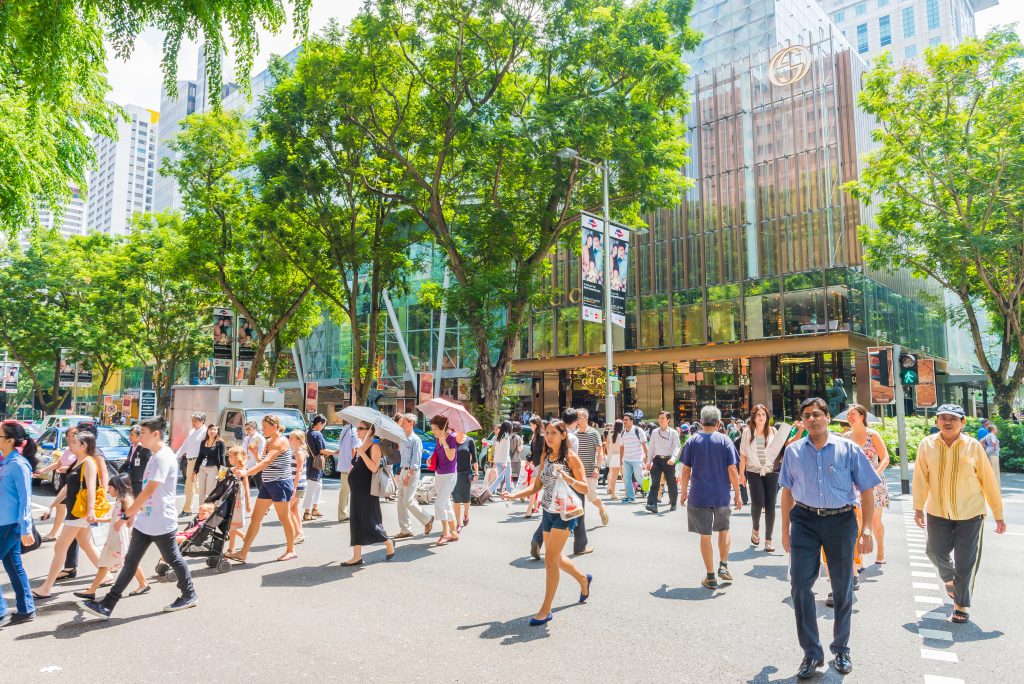
The consequences of climate change are going to keep worsening, and that too poses a real threat. To be a small tropical island in a world of rising seas and great storms and heat waves – that’s a great challenge. But if any place can build itself some security from the impacts of climate change, it’s going to be Singapore. On climate change and oceans and other issues, Singaporean diplomats have played a disproportionate role in helping the world move forward. It is often said that Singapore punches way above its weight internationally. That’s because of the quality of the people that are involved in engaging Singapore with the rest of the world — the quality of the diplomatic corps and the quality of the international engagement. Its work on climate is something we should all be grateful for.
Another key challenge is the question of Singapore’s low birth rate. The demographic crisis is an existential one. There are efforts to bring in migrants, but I’m not sure those match the scale of the challenge yet. So, what’s going to happen there?
And another issue for Singapore, curiously, is that it has a very effective bureaucracy. It’s very good at top-down initiatives. But the whole set of issues that we’re talking about in the polycrisis requires a degree of capacity for bottom-up, self-organised engagement. It requires going far beyond consulting with the citizens; it requires empowering and engaging them. And that’s not something most governments are good at.
On climate change and oceans and other issues, Singaporean diplomats have played a disproportionate role in helping the world move forward.
Dr. Ann Florini, Fellow, Political Reform Programme New America
Singapore — like so many other countries — would benefit from a greater variety of voices engaged. This polycrisis isn’t just a current crisis, it’s a long emergency, and it’s the shape of the future. Things are going to get more challenging. To have a real diversity of voices involved in shaping how you respond — I think that’s something all governments are going to have to do.
Three Questions on Governance with Lim Siong Guan
The CGGI believes that governments have an important role to play in fostering innovation and a culture of excellence. Mr Lim Siong Guan’s extensive and historic public service experiences provide a rare and unique insider’s view on how these governance capabilities can be strengthened.
In your book and lecture series “Can Singapore Fall?”, you said Singapore needs to begin a new Age of Pioneers to stop the nation from falling into an Age of Decadence and an Age of Decay. What do you think is the government’s role in ushering in a new Age of Pioneers?
Lim Siong Guan: Pioneers are people who create and who get into new spaces, be it business or technology, society or culture. The government’s role would be to encourage and enable the spirit of innovativeness. Opening space for start-ups today is an example, but probably too narrow. The spirit of innovativeness should not be just about start-ups or technology. We should want the bus captain, the nurse, the teacher, the homemaker…everyone to imbibe and display openness to, and practice innovativeness. It is a process that needs to start even before school.
Cultivating the right culture is a big part of running a successful civil service. As the former Head of Civil Service, you were also instrumental in building the Public Service for the 21st Century programme. What were the elements of Singapore’s civil service culture that allowed it to become one of the best civil services in the world? How was this culture intentionally built? What advice do you have for other government leaders who are seeking to build a strong culture in their civil service?
We try to inculcate in every civil servant the sense that they are important players in creating the best possible Singapore for Singaporeans today and into the future. They are not simply to follow the orders of the minister, but to actively contribute towards creating the kind of Singapore they think is good for future generations. This process is enormously enabled by what the founding Prime Minister Mr Lee Kuan Yew believed, that no matter what brilliant ideas his ministers may have, they come to nothing if there is no civil service which has the competence and effectiveness to bring the ideas to life. The congruence in the intentions of the political and public service leaderships to attend to the long-term survivability and continued success of the nation produces real power and energy.
You were Principal Private Secretary to Singapore’s first Prime Minister, Lee Kuan Yew. What were some key lessons you learnt from him on effective governance?
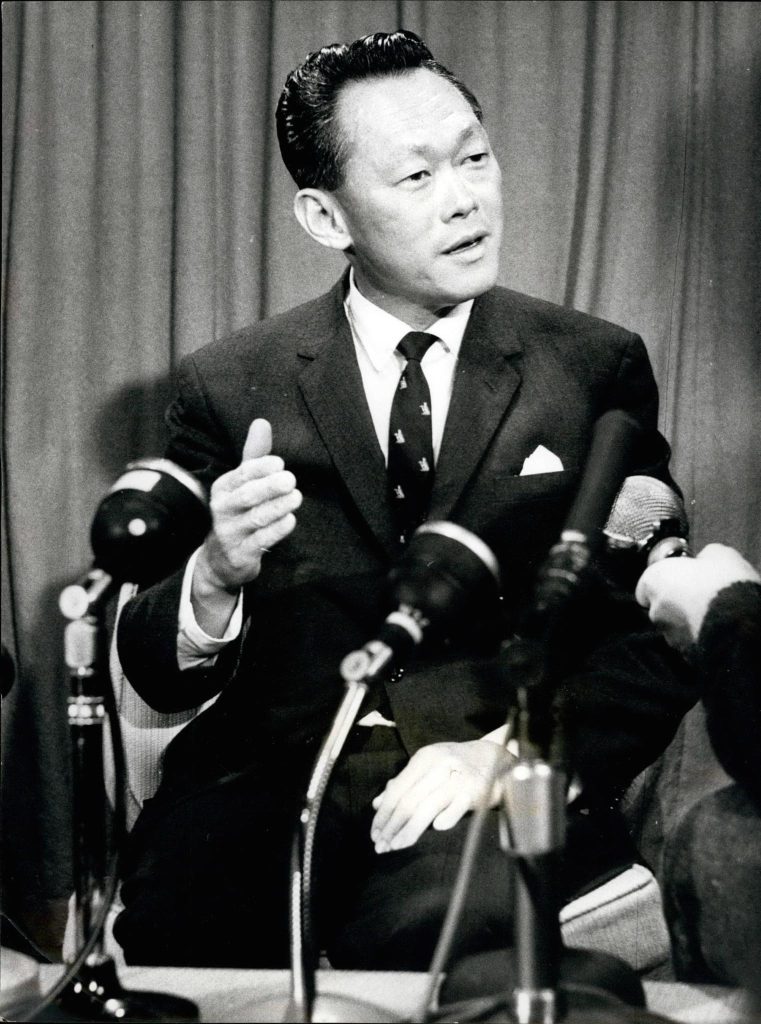
The most important lesson I learnt was that running a country cannot be like running a company. When running a company, removing the poorer performers among its workers will improve the overall performance of the company. When running a country, the government has to provide for all. And in the process, the government should eschew the politics of expedience – doing what is convenient for the moment – and instead adopt a politics of explanation and of conviction – to explain and convince the people of the need sometimes for unpopular policies to secure a worthy future not just for the current generation, but also for the generations to come.
More Stories


Global Influence & Reputation Country Snapshot: Türkiye
